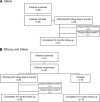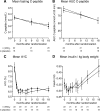No effect of the 1alpha,25-dihydroxyvitamin D3 on beta-cell residual function and insulin requirement in adults with new-onset type 1 diabetes
- PMID: 20357369
- PMCID: PMC2890336
- DOI: 10.2337/dc09-2297
No effect of the 1alpha,25-dihydroxyvitamin D3 on beta-cell residual function and insulin requirement in adults with new-onset type 1 diabetes
Abstract
Objective: To determine whether daily intake of 1alpha,25-dihydroxyvitamin D(3) [1,25(OH)(2)D(3)] is safe and improves beta-cell function in patients with recently diagnosed type 1 diabetes.
Research design and methods: Safety was assessed in an open study of 25 patients aged 18-39 years with recent-onset type 1 diabetes who received 0.25 microg 1,25(OH)(2)D(3) daily for 9 months. An additional 40 patients were randomly assigned to 0.25 microg 1,25(OH)(2)D(3) or placebo daily for 9 months and followed for a total of 18 months for safety, beta-cell function, insulin requirement, and glycemic control.
Results: Safety assessment showed values in the normal range in nearly all patients, regardless of whether they received 1,25(OH)(2)D(3) or placebo. No differences in AUC C-peptide, peak C-peptide, and fasting C-peptide after a mixed-meal tolerance test between the treatment and placebo groups were observed at 9 and 18 months after study entry, with approximately 40% loss for each parameter over the 18-month period. A1C and daily insulin requirement were similar between treatment and placebo groups throughout the study follow-up period.
Conclusions: Treatment with 1,25(OH)(2)D(3) at a daily dose of 0.25 microg was safe but did not reduce loss of beta-cell function.
Trial registration: ClinicalTrials.gov NCT00960635.
Figures



References
-
- Atkinson MA, Eisenbarth GS: Type 1 diabetes: new perspectives on disease pathogenesis and treatment. Lancet 358: 221–229 - PubMed
-
- Vitamin D supplement in early childhood and risk for type I (insulin-dependent) diabetes mellitus. The Eurodiab Substudy 2 Study Group. Diabetologia 1999; 42: 51–54 - PubMed
-
- Hyppönen E, Läärä E, Reunanen A, Järvelin MR, Virtanen SM: Intake of vitamin D and risk of type 1 diabetes; a birth-cohort study. Lancet 2001; 358: 1500–1503 - PubMed
-
- Zipitis CS, Akobeng AK: Vitamin D supplementation in early childhood and risk of type 1 diabetes: a systematic review and meta-analysis. Arch Dis Child 2008; 93: 512–517 - PubMed

